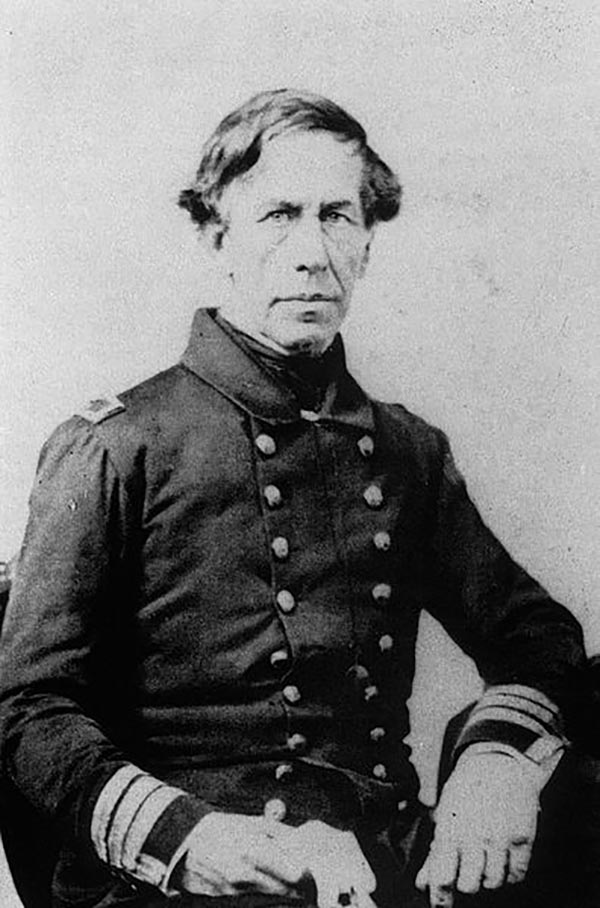Charles Wilkes (April 3, 1798 – February 8, 1877) was an American naval officer and explorer. Wilkes was born in New York City to a prominent family. His mother died when he was just three years old. Consequently, Wilkes was raised by his aunt Elizabeth Ann Setton, the first American born woman to be canonized a saint of the Roman Catholic Church. Inspired by tales of nautical adventure, Wilkes embarked on several merchant voyages, including one to the South Pacific. Finding shipboard life unpleasant, he returned to New York City where attended Columbia College (today's Columbia University) studying various aspects of mathematics and the sciences. For a time Wilkes was a prodigy of Coast Survey Superintendent Ferdinand Hassler. Before the relationship went foul, Wilkes mastered Hassler's sophisticated techniques for navigation and nautical surveying. Though the Coast Survey at this time was underfunded, several coastal mapping expeditions were launched, one of which focused on Narragansett Bay and was headed by Wilkes. In 1833, impressed with his work on Narragansett Bay, the Navy placed Wilkes in charge of the Navy's Depot of Charts and Instruments in Washington, D.C, out of which developed the Naval Observatory and Hydrographic Office. In 1838, after years of political posturing, he was chosen to lead the U.S. Exploring Expedition (U.S. Ex. Ex.), a multidisciplinary voyage to the Pacific with the lofty goal to
collect, preserve, and arrange every thing valuable in the whole range of natural history, from the minute madrapore to the huge spermaceti, and accurately describe that which cannot be preserved.The expedition lasted from 1838 to 1842. Wilkes gained the reputation for being a harsh and dictatorial leader often at odds with his sailors and sub commanders - so much so that some suggest he was the real life inspiration for Herman Melville's characterization of Captain Ahab. Nonetheless, the U.S. Ex. Ex. was a resounding success with long term political and scientific ramifications. Under Wilkes, the expedition surveyed 1500 miles of the Antarctic continent, mapped over 280 islands, explored over 800 miles of the Pacific Northwest, and catalogued over 60,000 plant and bird specimens. Despite his scientific achievements, the end of the expedition Wilkes was court-martialed for the loss of one of his ships on the Columbia River, for the regular mistreatment of his subordinate officers, and for excessive punishment of his sailors. He was acquitted on all charges except illegally punishing the men in his squadron. During this post-expedition period he was also employed by the U.S. Coast Survey, but it was mostly an honorary position with most of his energies being focused on preparing the influential five volume expedition report. Later, during the American Civil War (1861 - 1865) Wilkes commanded a Union naval vessel in the Trent Affair, a diplomatic incident in which Wilkes intercepted the British mail packet RMS Trent and removed, as contraband of war, two Confederate diplomats, James Mason and John Slidell. Wilkes died in Washington, D. C. on February 8, 1877 at the rank of Rear Admiral. In August 1909, the United States moved his remains to Arlington National Cemetery. His gravestone reads "he discovered the Ant-arctic continent".












